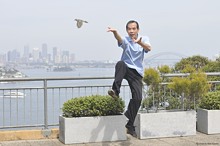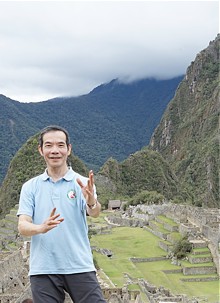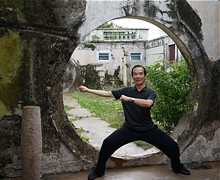Improving your Tai Chi
To improve your tai chi, it is essential to practice regularly, understand the tai chi principles and incorporating them into your practice. There are many ways to improve your level of tai chi, like climbing up a mountain, some ways are easier and more enjoyable. The four “directions” can help you understand the principles better and get to the more beautiful part of the mountain more quickly. These are jing 静, song 松, chen 沉, and huo 活.
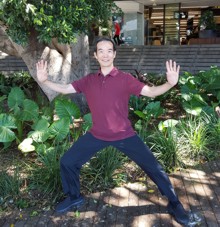
Some of the concepts below might not be clear to you. Don’t let that concern you too much. As you progress further, you’ll be able to understand them more. In time, as your level of tai chi deepens, the words will take on a somewhat deeper meaning. Like climbing up a mountain, at this height you can enjoy this view, yet a bit higher the view is different and more beautiful. Bear in mind that no one reaches perfection in all four directions; progression is what matters. Tai chi practice is a life long journey. As one of the greatest tai chi masters in history; Mr Sun Lu Tang said: “It is not reaching the top, the journey and how enjoyable it is what really matters.”
Jing
Jing means “mental quietness or serenity”. Think of the quietness in your mind; think of quietness from within. Imagine yourself in a quiet environment such as a tranquil rainforest. If you do this regularly, you’ll soon become quiet from within and be able to focus on what your body is doing. Another way to reach jing is to be more mindful or to be at the moment; or to inhabit your body.
Attaining a degree of mental quietness will take time. But once you have achieved it, you will remember the route. The next time you practise, your mind will be able to relocate the same state more quickly, and you’ll be able to move on to higher level. Jing improves relaxation; it
allows you to focus better. This, in turn, enhances balance and relieves muscle tension, most importantly it creates a space for your qi (life energy) to circulate and develop.
The mental quietness of tai chi is different from some other forms of meditation. While you are serene from within, you are still aware of your environment and able to assess the situation around you at any time – being mindful of the environment as well. A more jing state will help you deal with any crisis in real life more effectively. At time of need, saying the word jing quietly to yourself may help bringing you to that state.
Song
Song is often translated as “relaxation”, but it means more than that in Chinese, conveying a sense of loosening and stretching out of the joints. Imagine all your joints opening, loosening, or stretching out gently from within. Take your shoulder joint, for example. If you gently stretch out that joint, you’ll feel a small dimple on the top of the shoulder. If you tense the shoulder joint, the dimple disappears.
Now apply this idea to other joints, naturally you would not be able to another dimple. Visualize them loosening. In the upper limbs, loosen 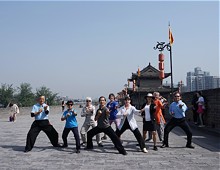
This method of loosening constitutes a type of controlled relaxation, because when you gently stretch your joints, you’re attaining song, and you can’t be tense. Song helps your qi flow powerfully through the joints, builds internal strength and also improves flexibility. It will also enhance jing. When your joints are song, your mind becomes more jing, and as your mind becomes more jing, it in turns further song your joints, thus setting up a positive circle.
Chen
Chen (not the same word in Chinese as the name of the style) means “sinking”. As you progress in tai chi, you’ll come across the term “sinking your qi to the dan tian.” Dan Tian is an area three-finger width below the belly button. The dan tian is central to everything we do in tai chi as it is the storage house of qi.
Exhaling facilitates sinking qi to the dan tian, which in turn keeps your mind jing and your joints song. You’ll find using my Dan Tian Breathing Breathing Method will help you to cultivate your qi and feel it more clearly. This sensation differs from person to person, but for most, it’s a warm, heavy feeling. As you breathe out, song your joints. You should 
Chen greatly enhances stability and improve balance. It also facilites song and qi cultivation. Awareness of the dan tian will strengthen the internal structures of your body, and improve coordination, and strengthen your spine.
Huo Huo means “agility”. Being strong, having powerful qi, and being in 